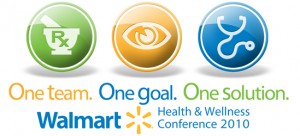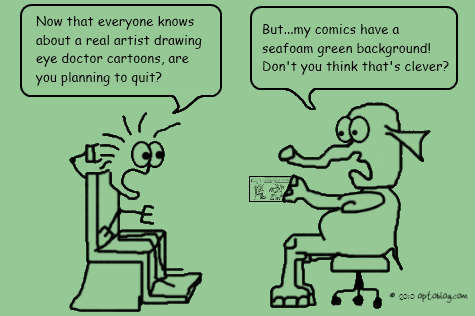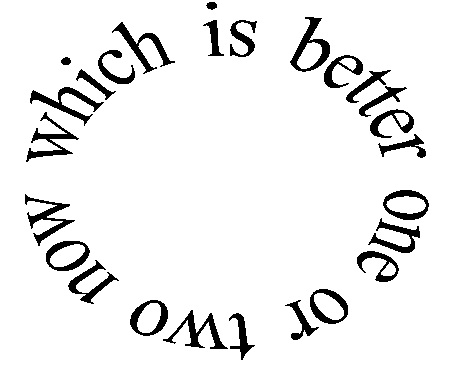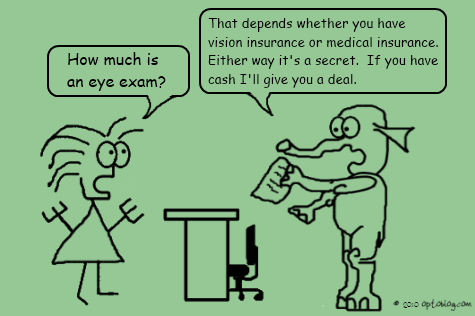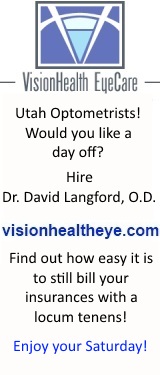Posts Tagged ‘optometrist’
Optometry Video
Apparently there was a video contest, and Marc Schmitt at PUCO submitted a great entry. I recognized three professors in it: Dr. Hannu Laukkanen, Dr. Dennis Smith, and Dr. Lorne Yudcovitch.
H/T to Dr. Maino.
Tags: doctors, Jokes, optometrist, optometry schoolI’m Going to Bentonville!
I intend to blog about my experience daily. As one of the few selected, I imagine there will be an occasion for me to express concerns and ask questions. If you have any comments or questions you would like me to consider voicing in Bentonville, then please write it in the comment section below. (Please be serious and civil.)
Here’s that e-mail:
Tags: commercial, Consultants, optometrist, Wal-Mart, WMHWC2010Dear David Langford
Historically, the annual Doctor meeting was primarily focused around Optometry. As our health and wellness businesses continue to become more integrated, we seek to further expose the important work of health care professionals to the greater Walmart organization. We also want our senior leadership to better understand the difference you are making every day in the lives of our patients. With that in mind, we will be hosting the Health & Wellness Conference May 3-5th, 2010 in Bentonville Arkansas.
You have been chosen through a nomination process to take part in this exclusive gathering of professionals; you’ll hear from the executive leadership of Walmart on our company’s ongoing growth strategy; discussion from governmental and NGO’s on health care reform in America as well as inspirational messages from medical visionaries on the impact they are making within their communities.
We have made several changes of this conference design from years past. For example a smaller more intimate gathering will facilitate the opportunity for you to interact with and learn from key leaders as well as your peers. Representatives from all of the Walmart Health & Wellness business units will take part including professionals from the practices of Optometry and Pharmacy as well as our Clinic Operator partners in addition to select representatives of our internal support teams.
In addition we elected to conserve time and resources in an effort to present a holistic message around health care and the challenges that our customer, health care professionals and company is facing today, therefore CE credits will not be offered at this meeting. And as this meeting has been limited to a select group of attendees, we are asking that spouses not attend.
We look forward to having you take part in the Health & Wellness Conference 2010. Please click the View Event Summary link below, view the event details, and respond by clicking either the Yes or No button at the bottom of the invitation. Or you can simply select the register button on the Event Summary website. Registration will close on March 13th, 2010
Thank you,
Health & Wellness Professional Affairs
Optometry Comic Comptetitor
It appears that another optometrist with an actual art degree has been making comics for years and now has a book out. Review of Optometry even did a profile on Dr. Scott Lee, O.D.
I’ll bet he even draws them on paper instead of using a mouse in Paint.net.
Well, I see I shall have to get my game on to compete. But there is one thing Dr. Lee doesn’t have: seafoam green backgrounds. Yup, that was my idea.
I also now have Optoblog poetry, so I’m really diversifying my portfolio which will pay big dividends when I cash in on my book deal.
Be sure to stay tuned to my Optoblog comics. They’re just for optometrists. Patients won’t get them, but you will. Feel free to use them in your C.E. presentations. Send me a cell phone photo when you do!
Tags: artist, Comics, optometristIntroducing Optometry Poetry
Optoblog.com revolutionized optometric blogging when it added the cartoon comic feature. Well, I’ve done it again with a new feature: Poetry. This inaugural poetry post features a form of haiku called cirku.
Enjoy! Subscribe to the site feed to stay updated!
Tags: optometrist, patients, PoetryThe CON in Contacts
So apparently people have caught on about the negative verification and con the system to get contacts without actually getting an eye exam.
This patient from Dr. Bazan’s office shares her experience.
It really does help to see the doctor to get the best contacts for your eyes. Not only contacts, but info about contact lens solutions. I can’t tell you how many people love ClearCare yet they had never heard of it before I explained it.
I wish people would value the doctor.
BUT, should the law should punish people who buy contacts without a real prescription?
The libertarian in me says no. I should be able to buy antibiotics at the pharmacy without a prescription if I want. The only thing bringing some people in for an eye exam is getting that piece of paper, but it turns out some people don’t even bother with the Rx paper and just game the mail-order system.
The solution? Teach people to value the doctor. We can foster that value every time the patient has an evaluation by explaining how glad we are that they came in. We must be sure to educate how great it is that they had an eye exam whenever:
- their Rx changes
- we change their contacts to a better lens for comfort and eye health
- we recommend a better, more compatible, care system for their eyes and contact lenses
- we educate them on the latest and greatest options for them, even if they don’t want or require a change in lens or care system
- they have a medical condition related to their eyes
And I don’t hold the prescription over their heads. The Utah law is that I make the expiration date for two years if their eyes are healthy; however, I frequently mention that it is best to have a yearly eye exam, especially if they note even a subtle change in their vision.
Tags: 1-800, Acuvue, Check Yearly, contacts, optometrist, patientsThe New Phrase is: “Insurance Free Medicine”
I think we should all consider going the route of “insurance free medicine.”
From guest blogger Dr. Mintz at Kevin, MD:
Thus, I think a term that I would like to propose for use in further discussions of newer ways of practicing primary care is “insurance free medicine.” The term “insurance free medicine” captures the essence of the newer models of primary care. Patients have certainly seen their premiums and deductibles increase and can probably relate quite well to reasons why a doctor would not accept insurance.
Insurance free primary care practices could certainly adopt retainer membership fees and promote improved access, but eliminating terms like “boutique,” “concierge,” and “cash only” might help eliminate the notion that primary medical care without insurance is somehow tainted or only for the super-wealthy. Previously, I discussed that without substantial changes, primary care will soon go the way of psychiatry in that patients who use their insurance to see a psychiatrist get one kind of care (very brief visits, mostly management by a non-physician) and those who pay their psychiatrist out-of-pocket get the kind of care that we see in TV and the movies.
With more frequent use of the term “insurance free medicine,” patients might start realizing that if they continue to pay their primary physician using their health care insurance, they should expect even briefer visits, longer waits to get in, seeing non-physicians, and greater delays getting a return phone call or results back.
I calculated the other day that I spent about $2000 a year to be set up and able to bill insurance. Further, I spent all that time and money for about 538 patients, or close to one-fourth of my patients per year. Now that Walmart no longer bills many vision plans for me, both numbers will go up, and so will my accounts receivable. In anticipation of this, my fee went up by $5 per patient at the beginning of the year.
I would lower my price if we could all convince the general public that routine medical office visits should be paid out of pocket. Your car insurance doesn’t pay for oil changes.
Tags: commercial, insurance, management, optometrist, patientsExam Fee Ethics
There is a not-so-simple question that pretty much every patient asks, “How much is your eye exam.”
While the medical model has varying levels of exam, like Level II-New vs. Level IV-Est, which depend upon the history, exam, and complexity of that particular case; however, there are some among our profession that make it an especially hard question to answer, and this issue raises concern over the ethics of a fairly popular fee structure.
For example: the price in front of the Big Box says “Eye exams starting at $45!”
But are they really? Sure, for a “routine eye exam” where nothing is wrong and you just want your glasses updated, then it’s the $45. But what if I have some allergy eyes, so the doctor gives me a prescription for Pataday as well as my glasses Rx? All the sudden the exam somehow costs $120!?!?
Huh, something funny going on around here. I think big box doctors are more likely to do this since their exam fees are so low, they make up for it by gouging in other fees. I have no problem with a doctor who says their S0620 is $100 and their 92004 is $120. However, I think there is something wrong if the S0620 is $45 and the 92004 is $140.
It’s like some among us in the optometric profession are playing the windshield chip repairman scheme.
But what really happens? Patients won’t typically notice this bait-and-switch. It’s really the insurance companies who get hammered. The patient pays their copay, and if the doctor can come up with any excuse to bill a medical code, they use their medical model fee structure to justify it.
Ethics applies when we realize that, for some reason, private pay patients are rarely charged the same high fees as the insurance companies. Huh. Oh well. It’s a victimless crime because those big, bad insurance companies won’t miss the extra cash. Until we realize that the more insurance companies pay out, the more the patient’s premiums will be raised next year. Whoops. Sorry, Mrs. Smith, that you can’t afford to keep your medical insurance in the future because I wanted to get paid double or triple my usual fee because you have insurance today.
By the way, it cost me about $2000 to bill insurance last year (PIM software license, E-filing charges, and postage/paper for mailing statements/refunds). Also add to that the cost of time spent filing claims and handling overpayment and underpayment. If I didn’t have to deal with insurance, I could drop my exam fee by at least $5 per person.
I have an idea: All patients should pay for office visits out of pocket. If they have insurance, get reimbursed later. The doctor won’t know about their insurance, so there won’t be a conflict of interest about what exam fee structure he’ll choose. The doctor can lower his fees since filing claims is expensive and time consuming. Everyone wins. Another idea, insurances should allow me to charge either them or the patient a $5 claim filing service fee.
Take home point: I don’t believe it is ethical to have one fee structure for insurance patients and another drastically different one for private pay. Yes, I’m all for charging more money if something is more work and more time. That’s why a contact lens evaluation is paid on top of the routine eye exam. That’s why there are different levels of 99*** office visits. But sneaking a huge fee onto an insurance claim just because there is some medical code excuse is something I don’t think our profession should feel comfortable with.
Tags: Comics, commercial, Consultants, Income, insurance, optometristAnswers to Your Search Questions Part 3
In Answers to Your Search Questions Part 1 and Part 2, I improved by search juice and answered the questions that seem to be on everyone’s mind.
Well, I’ve done it yet again. There seems to be no end to all the inquiring minds out there. Just to review, I know what IP address you have and the URL that was in your address bar just before coming to my website. A search URL contains the search term that you used.
- “is Crizal worth the extra expense” – That depends. The original Crizal, Crizal Alize, Crizal Alize’ with ClearGuard, Crizal Avance’ with Scotchgard, or the next one that they come out with 6 months after you buy the one available now.
- “satan’s plan” – This search term was by someone from Lagos, Nigeria, Africa. (It directed them to this post.) Lemme splain. In pre-earth life, Jesus wanted us to have the freedom to choose to follow Heavenly Father and obtain Eternal life. Those who don’t obey God’s will and never repent would be lost. Those who disobey (all of us) would need a Savior in order to be worthy enough to enter into God’s presence again. Well, the Son of the Morning didn’t like that. Satan, wanted us all to be forced to choose God and obey His commands so that none of God’s children would be lost. It’s kind of like liberals vs. conservatives when you think about it.
- “what scanner should you use with officemate” – If you are going to scan, go big. You will not regret buying a fast document scanner like the Fujitsu 6130. I used to have a slow HP ScanJet N6010. It lasted two years and died. I wasted so much time waiting for files to scan. With my Fujitsu, waiting is a thing of the past. Let’s say you get an EOB that you want to scan into OfficeMate. You pull up the patient’s file, select the eDocuments tab, and then press scan. It will scan duplex, then you hit complete, and you’re done. Fast, fast, fast. Plus mine came with Acrobat 9 Standard.
- “nbeo optometry review notes” – I just wanted to bring this up because I’m so glad I’m done with school and boards.
- “how to recharge pachmate dgh55” – I’m thinking you should read the owners manual. If you don’t like keeping dead trees around, then scan it into a pdf with your Fujitsu scanner.
- “stylish medicaid frames” – NO SUCH THING
- “screening acute angle glaucoma with mydriasis with pen light in pcp office” – Yah, so what I think they want to know is before they dilate somebody, what’s the likelihood that they give them an angle closure pressure spike. I believe that should be in the manual for your nifty DigiScope. Someone in Maryland should just refer to their local optometrist.
- “best way for optometrist to get FDA job” – I’m pretty sure you can get any government job you want by contributing enough money to the DNC. If you’re not a trust fund child, then I would spend loads of money to attend optometry school, study hard, work hard, graduate, and join the rest of America in the unemployment line.
- “optometrists are stupid” – Someone in Alameda, CA was having a bad day.
- “crack officemate” – Some web surfer in Indiana needs a crack for Officemate. Let’s see, I’m pretty sure stealing around $6000 for the initial year and ~$1400 per year after that could be considered enough to get you in trouble with the state optometry board. I don’t think it’s worth it. If you can’t afford it, do yourself a favor and try something else. Or, like I’ve said before, if you’re willing to crack expensive, niche software, then why stop there? Robbing banks and pimping can “earn” you boat loads of tax-free money.
- “average christmas bonus for optometrist” – Let’s see. Um, try about $0.00
- “pronounce similasan” – put the emphasis over the second “i” and then say the rest really fast. sim-IL-uhsahn. Or call their consumer information line, 1-800-240-9780, and they say it on the recorded message.
- “Biofinity review” – This is by far the most searched term by people coming to my website from google and yahoo. Seriously, why don’t you just try it for a week or two? If you don’t like it, then try something else! These lenses could work great for you and terrible for someone else- or vice versa. It’s like asking other people if a certain brand or size of orthotic shoe insert works good.
I’m here to help.
Tags: Answers, economy, EHR, Jokes, optometrist, politicsOptometrists and Labs Need Encrypted E-mail
E-mail is awesome because you can send notes, pdf’s, and other files quickly and easily- except when you are a doctor. Since any script kiddie can sniff your e-mail inbox, doctors can’t send e-mails of cornea topographies to labs, referrals to colleagues, or special testing results to patients because that would be a breech of patient confidentiality and a violation of that one unnecessary, burdensome law.
I’m sure George Q. Public doesn’t want his K-readings leaked to the press when he decides to run for President someday.But seriously, sometimes birth dates and stuff are printed on the reports, so if doctors want to use this cool, new thing called “e-mail,” we’ve got to set-up our e-mails to have the capability to send and receive encrypted messages and attachments. What does it look like?
hQEQA+fCUifC1JYBEAALBTMH/14qvUP037oLntVx4WGUXl7b4+6NLQVDGNTD
i6zZejhe2/AzCrNB1tLhUU9HNh70e4Wi1eIAj/08QFZvlTZY+F641HR4XsZd
C6yAdvtsL8BCqcI0wJZQLXY7viioJiMz1cZW0w5fD81ld4acFgAi6Fbh9hUg
J3w42fcoE9JdRSnVbrsNrMtO0mBlvGl2lYWzEQYvHA5uPmYLLETiRwLWxBgS
L+ALi1MyvAK4VOoGQ44dmCOpbaKQ7IBG3SOfdDOR0f1ISF6HLm7J4TupVqcP
a4Up+7XoCK7nAZiCHFr4J/IhQ09Xe/7AlU5lBo2A7BlE7tsu9Ouke5bMuM2T
w7ZT9rukaNNXCXuWUCx9TwF3SRbuYen5+htDPzfl8a3JlYLG9DGvQFdD4jM5
WM9HQHce7BqpkHmEInfbvnYM5OI31N3QEvFk5E1OVn508MB+OM4KGK3PPqTi
So your email inbox gets a message that looks like this. You have an e-mail client plugin that you have set up. You input your password, and the message magically translates to:
Dude, isn’t this so cool that not even the government can tell what I’m writing you? Unless…you forward this message to them unencrypted, but I trust you.
You can see this in action on my practice website. To get started and do this you need a few things:
Your practice’s domain name (usually your web host will offer e-mail storage)
or
any e-mail address that you can access via the e-mail client Thunderbird. (ie POP3 or gmail)
Download the following:
- GnuPG– the free, open source engine that runs encryption. The Windows version is found at gpg4win.org.
- Thunderbird– a free, open source e-mail client.
- Enigmail– a free plugin for Thunderbird that makes it easy to make your encryption keys, share your public key, store other people’s public keys, and encrypt/decrypt e-mails. You should read the install instructions for Enigmail.
Make sure when you generate your encryption key password that it is extra long and random. You must assume that anyone could capture it and try to brute force it. If it is long and random, it would be nearly impossible to crack. I suggest keeping your random, long password in a password wallet.
Why not do it?
- You are afraid.
- You don’t get paid to e-mail patients.
- Spam? Some people think that if they share their public key on a key server, spammers will harvest their e-mail address. I’ve had mine there for a couple years and that’s not happening…to me.
Barriers to entry:
- It doesn’t do any good for you to have e-mail encryption if the person to whom you want to e-mail the top-secret K-readings doesn’t have e-mail encryption set up. They must have a public key that they share.
- I’ve just presented a free way (unless you have a paid practice URL/webhost) to do this, but it does require some tech savvy to download, install, and implement the tools. This way requires the Thunderbird e-mail client. If you use Outlook or something, there are paid solutions out there.
Why do it?
If every doctor would just get in gear with e-mail encryption keys, we could send patient referrals with high quality color photos and reports instead of low res, black and white faxes (usually with a few vertical black lines on the page). We could send the lab a topography. We could send a patient a report or copy of their Rx. We could talk about the stupid government and how we all secretly agree with Glenn Beck, Rush Limbaugh, and Ann Coulter.
Tags: communication, HIPAA, management, optometrist, patients, politics




